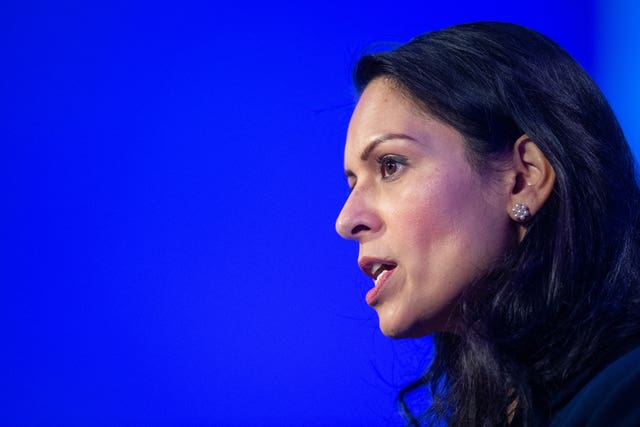Online platforms that fail to protect users or remove harmful content face multimillion-pound fines and being blocked in the UK under new laws, the Government has announced.
However, proposals for criminal liability for senior executives at non-compliant firms appear to have been scaled back, with the Government aiming to bring those powers into force through secondary legislation.
Ahead of publishing a full response to the Online Harms White Paper, Home Secretary Priti Patel and Digital Secretary Oliver Dowden said the proposed laws would create a “new age of accountability” for social media platforms.

Under the new rules, which the Government will bring forward in an Online Safety Bill next year, Ofcom – in its new confirmed role as regulator – will have the power to fine companies up to £18 million or 10% of global turnover, whichever is higher, for failing to abide by a duty of care to their users – particularly children and the vulnerable.
It will also have the power to block non-compliant services from being accessed in the UK, while the Government said it would also reserve the right to impose criminal sanctions on senior executives, powers it says it would not hesitate to bring into force through additional legislation if firms fail to take the new rules seriously.
The proposed legislation will apply to any company in the world hosting user-generated content online which is accessible by people in the UK or enables them to interact with others online.
A small group of high-profile platforms will face tougher responsibilities under a two-tier system, with Facebook, TikTok, Instagram and Twitter to be placed in Category 1 as the companies with the largest online presences and most features deemed high-risk.
In addition to being required to take steps to address illegal content and activity and extra protections for children who access their services, firms in this group will be asked to assess what content or activity on their platform is legal but could pose a risk of harm to adults, and to clarify what “legal but harmful” content they see as acceptable in their terms and conditions.
Writing in The Daily Telegraph, Mr Dowden said this legal content could include anti-vaccination disinformation or cyberbullying.
Mr Dowden wrote the new measures would bring advances including that “a 13-year-old will no longer be able to access pornographic images on Twitter. YouTube will be banned from recommending videos promoting terrorist ideologies. Criminal anti-Semitic posts will need to be removed without delay, while platforms will have to stop the intolerable abuse that many women face.”
The legislation will require all firms in Category 1 to publish transparency reports detailing how they are tackling online harms.
Ms Patel said: “We are giving internet users the protection they deserve and are working with companies to tackle some of the abuses happening on the web.
“We will not allow child sexual abuse, terrorist material and other harmful content to fester on online platforms. Tech companies must put public safety first or face the consequences.”
The scope of the new legislation will not include online articles and comment sections, as part of efforts to protect freedom of speech.
The Government said it was also working with the Law Commission on whether the promotion of self-harm should be made illegal.
In addition, it confirmed that it plans to include private communications such as instant messaging services and closed social media groups within the scope of the regulations.
It said the proposals will see Ofcom require firms to use highly accurate targeting technology to monitor, identify and remove illegal material such as that linked to child sexual exploitation and abuse.
The Government said it recognised the potential impact this could have on user privacy and added it would ensure the measures were only used as a last resort where other means had failed, and would be subject to legal safeguards to protect user rights.
This area of the proposals is likely to lead to clashes with tech giants like Apple and Facebook, who use end-to-end encryption to boost privacy and hide some user content from even the firms themselves.
“I’m unashamedly pro tech but that can’t mean a tech free-for-all. Today Britain is setting the global standard for safety online with the most comprehensive approach yet to online regulation,” Mr Dowden said.
“We are entering a new age of accountability for tech to protect children and vulnerable users, to restore trust in this industry, and to enshrine in law safeguards for free speech.
“This proportionate new framework will ensure we don’t put unnecessary burdens on small businesses but give large digital businesses robust rules of the road to follow so we can seize the brilliance of modern technology to improve our lives.”
In response, chairman of the Digital, Culture, Media and Sport (DCMS) Select Committee, Julian Knight, welcomed the Government’s plans but warned that the holding back of criminal liability for the executive of non-compliant tech firms could soften the impact of the regulations.
“Today marks a major step forward in laws that will see powerful tech companies held to account,” he said.
“Credit is due to the work of the DCMS Committee in the last parliament for its extensive investigation into disinformation and fake news that led the charge for online regulation.
“A duty of care with the threat of substantial fines levied on companies that breach it is to be welcomed.
“However, we’ve long argued that even hefty fines can be small change to tech giants and it’s concerning that the prospect of criminal liability would be held as a last resort.”




Comments: Our rules
We want our comments to be a lively and valuable part of our community - a place where readers can debate and engage with the most important local issues. The ability to comment on our stories is a privilege, not a right, however, and that privilege may be withdrawn if it is abused or misused.
Please report any comments that break our rules.
Read the rules here